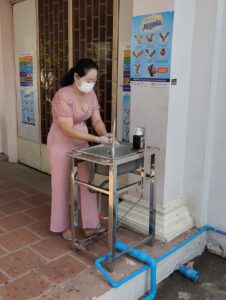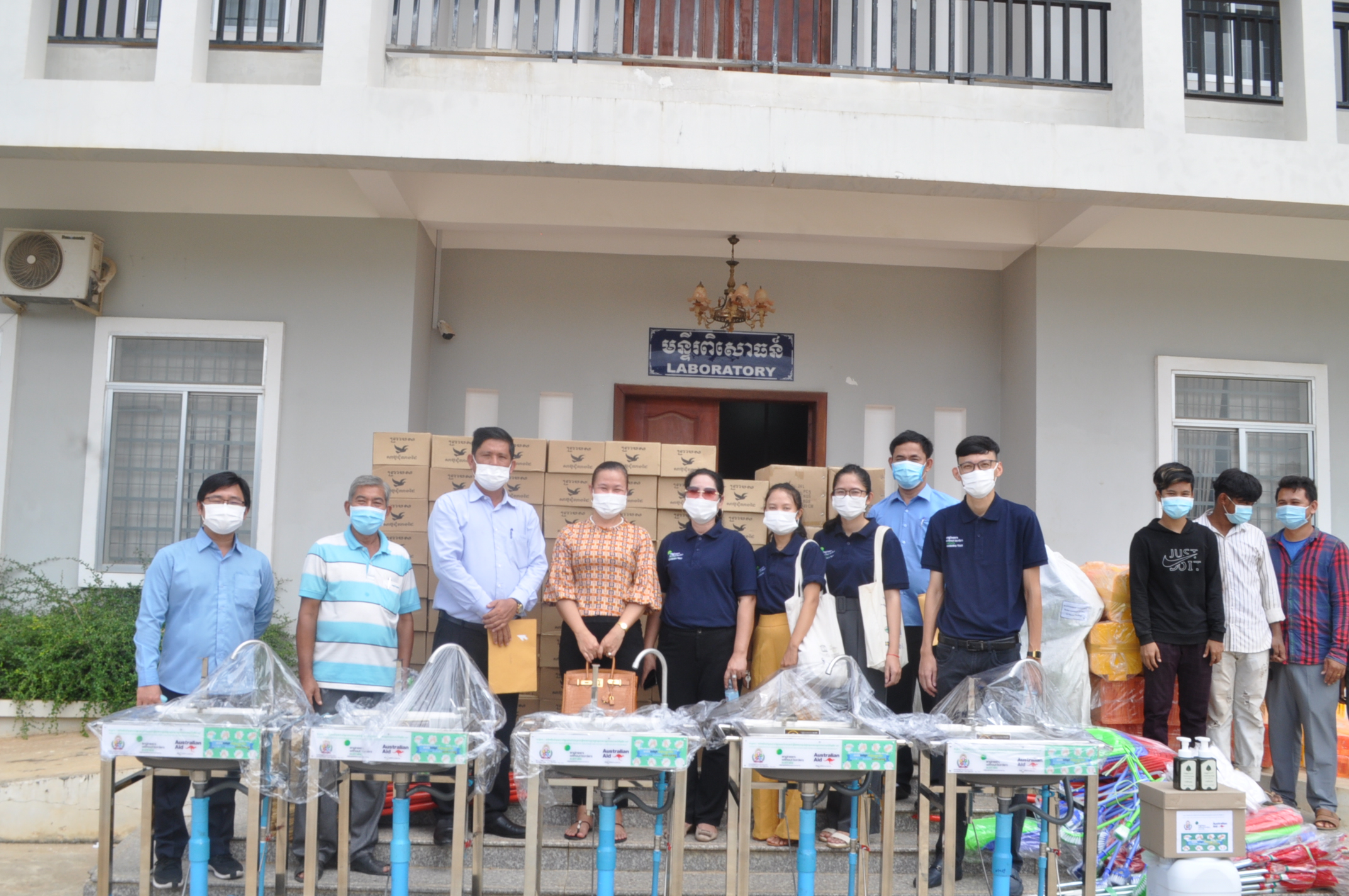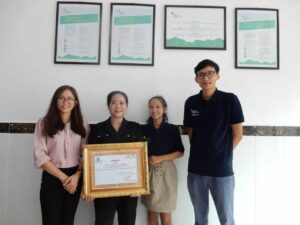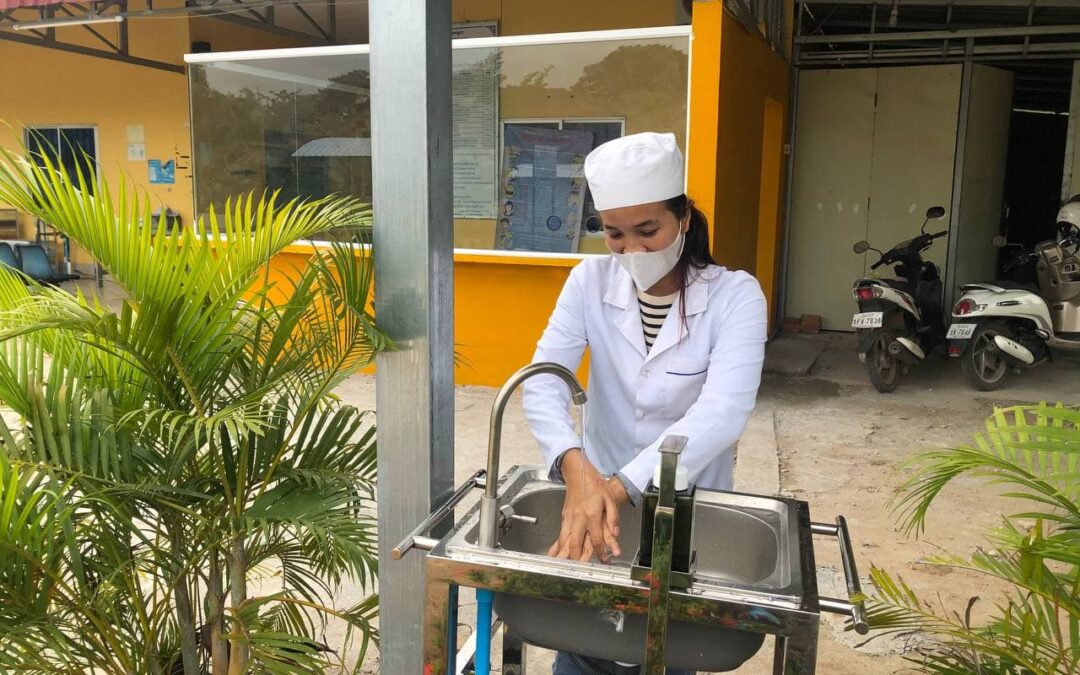Pictured: A nurse at a quarantine centre in Preyveng province using the EWB hand washing station.

Dy Many testing a hand washing station at a quarantine facility in Phnom Penh.
The Engineers Without Borders Australia team in Cambodia have been awarded a Certificate of Appreciation from the Cambodian government in recognition of their outstanding work helping to stop the spread of COVID-19. Our team, led by Cambodia Country Manager Dy Many, have successfully installed 150 hand washing stations across 48 rural and urban quarantine facilities to help communities stay safe during the pandemic. Their work has benefited the 455 medical professionals working in these treatment centres along with the 13,073 patients they treat, who now have access to safe and hygienic washing practices.
COVID-19 in Cambodia
Cambodia was spared the brunt of the pandemic last year, recording its first case of community transmission in early December 2020. Favourable demographics initially helped Cambodia avoid significant outbreaks: 75% of Cambodians live outside of urban centres, and almost two-thirds of the population are under the age of 30. Unfortunately, this all changed in March 2021, when a surge of cases linked to quarantine breaches forced the government to close schools temporarily and introduce a two-week lockdown in Phnom Penh the following month. Case numbers rose steadily from April, reaching a peak on July 29th when authorities reported 1,130 new cases and 36 deaths. During subsequent protracted lockdowns, many areas of Phnom Penh and nearby Takhmao city were designated high-risk ‘Red Zones’; residents of these Red Zones were not permitted to leave their homes, even for shopping or exercise.
Our Response

EWB and government partners outside a quarantine facility in Kampong Cham. Right-left: Kong Ratha EWB Partnership and Mobilisation Coordinator; Provincial Department of Rural Development (PDRD) staff member; Chheang Mariny EWB Technology Development Project Lead; Keo Chanrika EWB Program Officer; Dy Many EWB Country Manager; PDRD Deputy Head in Kampong Cham; Dr. Lon Say Teng Director of the Department of Rural Health Care; officer staff members of the Ministry of Rural Development.
To help address the worsening pandemic, EWB drew on our long term partnership with the Cambodian Ministry of Rural Development. Alongside our government partners, EWB staff identified a large number of COVID-19 treatment centres that lacked adequate hand washing facilities for their patients, doctors and nurses. Their findings reflect the wider limitations of sanitation infrastructure in Cambodia; 12% of Cambodians do not have access to basic hand washing facilities with soap and water on the premises, a figure that rises to 40% in rural areas.
Recognising the potential for inequitable sanitation to exacerbate the spread of COVID-19, EWB staff have designed and implemented an innovative hand washing station that helps prevent the spread of communicable diseases. Rather than employing standard hand-operated taps near the basin, EWB created a hand washing station that is foot-operated; the user presses two pedals placed at the bottom of the machine to access clean water and soap. This design allows users to wash their hands without the risk of potentially transmitting the virus indirectly to another person through touchpoints.
The EWB team has installed the hand washing station (pictured below) in COVID-19 treatment centres in Phnom Penh and eight provinces badly hit by the pandemic: Kandal, Kampong Cham, Kampong Chhnang, Kampong Speu, Prey Veng, Svay Rieng, Takeo and Sihanoukville (see map). The vast majority of patients and medical staff surveyed (96.7%) use the hand washing station three times per day and report a clear preference (99.06%) for the foot-operated system over existing hand washing stations, even expressing an interest in installing the EWB-designed station in their business, home or school. The installation of hands-free hand washing stations will help regional and urban medical centres treat COVID-19 patients and reduce community transmission in Cambodia.
Government Award

In recognition of their community service and contribution to COVID-19 prevention, Dy Many and the team received a Certificate of Appreciation from the Cambodian Ministry of Rural Development in September 2021. The award thanks the EWB team in Cambodia for their work in “sanitation promotion, community outreach education and for providing materials to prevent COVID-19.”
Working alongside Many was a dedicated team of EWB engineers: Kong Ratha conducted concept design, produced the first prototypes of the handwashing station and performed extensive quality checks. Dy Many, Prak Pin, Chheang Mariny and Keo Chanrika worked with our partners in the Cambodian national government and multiple provincial health departments to coordinate installation. Chheang Mariny sourced affordable soap for the hand washing stations. Keo Chanrika designed a logo for the hand washing station and wrote an evaluation report for the project. Together, the team conducted community consultation and feedback surveys with the community; these showed that 99% of users were satisfied with the station.
Though the COVID-19 pandemic was the initial impetus for the project, EWB’s hand washing stations will continue to be used by patients and doctors to help prevent the spread of other communicable diseases, like cholera and typhoid, providing long term, sustainable benefit to the Cambodian communities with which we work.
EWB is supported by the Australian Government through the Australian NGO Cooperation Program (ANCP).
You can help support vulnerable communities EWB work with across the Asia-Pacific region by donating here.


